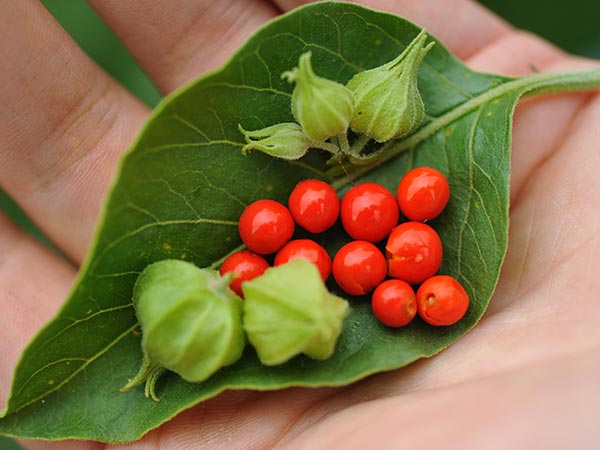How Awesome Is Ashwagandha?

Very quickly gaining in popularity in the U.S. as an “incredibly healthy” herb with centuries-old medicinal qualities, ashwagandha has a long list of attributes to its credit. One of the best known is its use as an adaptogen, meaning that it helps you manage stress.
Ashwagandha is translated in Sanskrit as “smell of the horse,” possibly as a double meaning: the herb exudes the peculiar odor of a horse, and it’s also known for its ability to increase strength and promote health when used regularly.
Other names include winter cherry and Indian ginseng, along with its botanical moniker Withania somnifera. Originating in the region of Pakistan, India and Sri Lanka, ashwagandha has been used by East Indian cultures for thousands of years, based on the 3,000-year-old alternative East Indian medicine known as Ayurveda.
It’s only been in the last 50 years that this member of the nightshade family of plants (Solanaceae) has emerged in the West as a potent healing herb, with growing popularity.
Actual Asian ginseng (botanical name Panax ginseng), also an adaptagenic herb, is one of the most sought-after herbal supplements in the U.S. and has several things in common with ashwagandha.
Besides easing fatigue in cancer patients and improving Alzheimer’s, they share a similar effect on infertility and emotional disorders.
Perhaps less well known and not quite as powerful as ginseng, ashwagandha currently sells for $12 to $15 per pound, while ginseng can sometimes go for $100 for the same amount. Nevertheless, ashwagandha has its following of people who value it for its many health advantages.
Originating in India and Northern Africa, the ashwagandha plant is a small shrub bearing small yellow flowers and teardrop-shaped leaves. It’s the leaves that hold the key to the health benefits. Dried and reduced to a powder, compounds called withanolides are possibly the most active ingredients.
Ashwagandha Shown to Fight Many Types of Cancer
Ashwagandha trials have demonstrated numerous and dramatic healing properties for many diseases and presented encouraging prospects in others. Possibly, its most zealously tested benefits are in regard to its ability to combat inflammation and tumor growth.1
In one animal study “using chemically induced and oncogene-driven rodent cancer models,” new cancer cell growth was inhibited:
“The plants used in Ayurvedic medicine, which has been practiced in India for thousands of years for the treatment of a variety of disorders, are rich in chemicals potentially useful for prevention and treatment of cancer.
Withania somnifera (commonly known as ashwagandha in Ayurvedic medicine) is one such medicinal plant whose anticancer value was realized over four decades ago after isolation of a crystalline steroidal compound (withaferin A) from the leaves of this shrub.” 2
Cancer cell apoptosis, or programmed cell death, is one of the ways ashwagandha is thought to exert cancer-resistant effects. It may also have an ability to generate reactive oxygen species (ROS) to kill cancer cells without harming normal cells.3
Researchers concluded after trials that ashwagandha may be valuable for combating lung,4 breast,5 colon,6 and a particularly aggressive brain cancer called glioblastoma multiforme, or GBM.7
In another study, mice with ovarian tumors were treated with ashwagandha in combination with an anticancer drug. Besides reporting a 70% to 80% decrease in tumor growth, metastasis, or the spread of tumor cell growth, was also obstructed.8
Ashwagandha Affects Insulin, Blood Sugar Levels and Inflammation
One valuable use for this herb is in relation to lowering blood sugar levels, as evidenced by a study showing its dual actions of increasing insulin secretion along with muscle cell sensitivity.9
In trials on people with schizophrenia, scientists found subjects to have reduced fasting blood sugar after four weeks.10 Similar results were recorded in another assessment, which showed effectiveness comparable to an oral diabetes drug.11
Chronic inflammation threatens individuals suffering from diabetes, as well as heart disease, obesity and cancer. The best defense against inflammation and the pain associated with it is in your diet, as multiple studies have demonstrated.
Ashwagandha can be added to the many healing herbs and spices shown to improve this condition.
Oxidative stress has been described as “an imbalance between the production of free radicals and the ability of the body to counteract or detoxify their harmful effects through neutralization by antioxidants.”12
Ashwagandha has exhibited reduced oxidative stress and inflammation in multiple studies and may be helpful for arthritis symptoms, as well.13
Ashwagandha Can Help Decrease Depression, Stress, Anxiety and Insomnia
There’s no denying that the rest of your body reacts to stress. One of the attributes of ashwagandha is its ability to induce calmness and clarity by regulating neurotransmitters such as serotonin and the stress hormone cortisol.
Your adrenal glands release cortisol when your blood sugar level drops too low and also when you’re stressed. When cortisol levels get too high, it can wreak havoc on your blood sugar, blood pressure and cholesterol levels, your hormone balance, immune system, and may even increase fat storage.
The good news is research has shown that consuming ashwagandha may not only reduce cortisol levels but also, as an adaptagen, can “substantially” reduce chronic stress14 to help your body adapt to and alleviate the stomach-churning anxiety stress can cause.
In one interesting study, anxiety test scores among 75 participants with moderate to severe anxiety were placed in two groups. Those treated with ashwagandha were shown to have “significantly decreased” symptoms as opposed to those undergoing more conventional interventions.15
Another review was undertaken to seek evidence of ashwagandha use in regard to gamma-aminobutyric acid (GABA), an inhibitory neurotransmitter significantly involved in regulating physiological and psychological processes signaling:
“Our results provide evidence indicating that key constituents in WS [ashwagandha] may have an important role in the development of pharmacological treatments for neurological disorders associated with GABAergic signaling dysfunction such as general anxiety disorders, sleep disturbances, muscle spasms, and seizures.” 16
Research indicates there’s a likelihood that ashwagandha may be useful for helping patients in opioid withdrawal as well as reducing or eliminating dependence on benzodiazapene drugs such as Xanax and Valium.
Infertility Alleviated, Muscle Strength Increased by Compounds in Ashwagandha
Stress can cause many seemingly unrelated ailments and conditions, including infertility — or perhaps the infertility causes the stress. In one study, ashwagandha supplements were given to 120 infertile men, while placebos were given to another 60 men classified as fertile.
“Treatment resulted in a decrease in stress, improved the level of antioxidants and improved overall semen quality in a significant number of individuals. The treatment resulted in pregnancy in the partners of 14 percent of the patients.” 17
Researchers also found that groups treated with this Indian herb showed dramatically increased muscle strength and muscle mass, as well muscle recovery after injury in several different bench press exercises after being treated with ashwagandha supplements for eight weeks.18
Further, participants taking ashwagandha in that study experienced more than double the percentage of body fat loss in comparison to those taking placebos. Interestingly, ashwagandha is also used in Ayurveda to stimulate libido in women, soothe painful periods and strengthen the uteruses of those who’ve had miscarriages.
Learning, Memory, Improvement of Neurodegenerative Diseases and More
One of the traditional uses for this herb was to improve memory and sharpen brain function, the age of the individual notwithstanding. That continues to hold true:
“In modern research, ashwagandha has been found to boost an important antioxidant in the brain called glutathione. Glutathione is an essential component for cell development, enzymatic activity, and for clearing toxins from the body.” 19
Numerous studies indicate there’s also hope for patients suffering from devastating disorders such as Alzheimer’s, Huntington’s and Parkinson’s disease. Scientists believe this ability comes through inhibited amyloid plaque that forms on the brain. It may also be useful for a neurological disorder called restless leg syndrome.
In people with underactive thyroid, in which the thyroid gland fails to produce the hormones needed, ashwagandha extracts have been found to significantly increase the hormone levels of patients with hypothyroidism. Scientists believe that, taken over time, this herb may also help with adrenal gland imbalances.
Natural Medicine — Much More in Line With Your Best Health Interests
Finding a plant that has as many uses as ashwagandha in regard to healing your body and mind makes it all the more clear that natural and alternative health care is so much more effective and less threatening to your body than what is pushed through today’s conventional medical practices.
In spite of many medical associations’ claims, natural medicine is one way you can take control of your health. Arm yourself with the facts about disease, what causes it and how to prevent it, rather than caving to the current medication-driven forum for “treating” disease and “managing” illness.
Sources and References
Authority Nutrition May, 2016
The Epoch Times May 16, 2016
Prevent Disease Dec. 9, 2015
1 Molecules July 3, 2009;14(7):2373-93
2 AAPS J Jan. 16, 2014;(1):1-10
3 PLoS One July 31, 2015; 10(7):e0134137
4 Mol Cell Biochem Nov. 2006;292(1-2)13-7
5 Anticancer Res Nov. 2014:34(11):6327-32
6 Immunol Invest 2010;39(7):688-98
7 J Neurooncol Jan. 2016;126(2):253-64
8 PLoS One Sept. 29, 2014; 9(9):e107596
9 Phytochemistry Aug 2015;116:283-9
10 Indian J Pharmacol July-Aug, 2013;45(4):417-418
11 Indian J Exp Biol June 2000;38(6):607-9
12 News Medical June 6, 2016
13 J Complement Integr Med June, 2015;12(2):117-25
14 Indian J Psychol Med July 2012;34(3):255-62
15 PLoS One Aug. 31, 2009;4(8):e6628
16 J Ethnopharmacol Aug. 2, 2015;171:264-72
17 Evid Based Complement Alternat Med Sept. 29, 2009 [Epub ahead of print]
18 J Int Soc Sports Nut Nov. 25, 2015;12:43
19 The Epoch Times May 16, 2016
